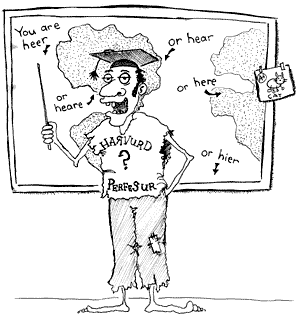Donate to IMPACT
Click below for info


• Crossing the Thames
• Quickies
(music reviews)
 • E-Mail Comments
• Archives
• Subscribe to IMPACT
• Where to Find
IMPACT
• Buy IMPACT T-Shirts
• Ordering Back Issues
• Home
|
Crossing the Thames Into America's Heartland
or
Why Okies Can't Find Oklahoma On A Map
by Adam Finley

art/Marty Kelley
If you live in the United States, stop and ask yourself where you are right now. If you're observant, you'll realize I gave you the answer in the first sentence, but do you really know where the United States is on a world map? According to an on-line geographical literacy survey designed by National Geographic, there are roughly ten percent of Americans who couldn't find America on a map as of this writing. To add insult to injury, more people in Canada, France, Great Britain, Japan, Mexico, and Sweden knew where the United States was located.
Ten percent isn't a lot, and considering that at least ten percent of the population is legally blind, perhaps we should cut ourselves some slack. However, I'm fairly certain that even if a person were blind, their seeing eye dog would be able to locate the United States for them.
The point of the survey was to show that geographical literacy desperately needs improvement in the United States. What was parenthetically proven was that ten percent of our population should never fly commercial aircraft:
Captain: Hello, folks, this is your captain speaking. This is your non-stop flight from Boston to Los Angeles. If you look out the left side of the plane you will see the River Thames, the only man-made lake in Southern Egypt. Out the right side of the plane you should be able to make out a large land mass known to its inhabitants as "The Canary Islands," which are surrounded on all sides by Finland. We will continue in a northwesterly eastbound direction for the remainder of the flight, and once we're above Mount Saint Helens, I'll let everyone know so you can observe the rich fertile soil of the Missouri Desert.
Whenever some news program wishes to pontificate on our lackluster education system, they immediately use the old standby of telling viewers how a high percentage of school kids couldn't find a certain locale on a map. This approach really doesn't prove anything, and is also lazy journalism. Any cretin with a microphone and well-coiffed hair can find someone on the street who doesn't know something. I'm sure even Einstein was ignorant of certain things:
Reporter: Thank you for explaining the Theory of Relativity to our viewers.
Einstein: My pleasure.
Reporter: Now then, what is the 3,786th word in the Bible?
Einstein: Um...
Reporter: And you call yourself an astronomer.
If the National Geographic Foundation is wondering why students are so benighted, I think the answer is inherent in the survey itself. As you take the survey, your concern is not to see how geographically savvy you are, but to try and make the United States' results better than the other countries' results.
Our educational system has always been based on this kind of idiotic award system. When we're able to memorize and regurgitate what is fed to us, we're awarded with letters of the alphabet. Somehow the measure of our own intelligence and cognitive ability can be represented by a large "A" scrawled onto a photocopied piece of paper with a red Sharpie. The absurdity of this became apparent when people began wearing "Harvard" sweatshirts. It didn't matter how smart you actually were as long as you had a symbol to prove it.
There are very few truly intelligent people in this world and, for the rest of us, our intelligence is usually relative. I can feel reasonably smart most of the day and then drive to Oklahoma and feel like Stephen Hawking. However, when I read Steven Hawking I feel like an Okie. On most days I feel about average, and I'm okay with that.
Still, I wish I had studied a bit harder in college and perhaps gone on to teach at a university. To think at the graduation ceremony I could have distinguished myself from the other professors in one of those bright-colored berets with the jaunty tassel hanging from it. I guess I'll have to live with the devastating fact that I'll never be able to prove my intelligence and capacity for abstract thought by dressing as a retarded clown.
•
Email your feedback on this article to editor@impactpress.com.
Other articles by Adam Finley:
|



